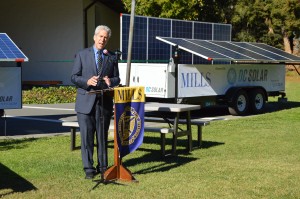(Video courtesy of Erin Armstrong)
Thirty people huddled together in the living room of Mills Hall. One student stood before them.
“My name is Erin Armstrong,” she began, “and I am a Mills woman. I’m also a transgender woman.”
On Nov. 20, Armstrong, a sophomore, hosted a ceremony for Transgender Day of Remembrance (TDOR), an international day dedicated to remembering transgender people who have been murdered.
TDOR was started by Gwendolyn Ann Smith, a transgender advocate, to honor Rita Hester, a transwoman murdered in 1998. The first TDOR ceremony at Mills was held in 2004. According to This year’s on-campus ceremony was co-sponsored by In Living Queer, Mouthing Off! and the Institute of Civic Leadership club.
Along with Adrianna Hutchinson, Coordinator of Engagement and Inclusion Diversity and Social Justice Resource Center, and junior Rivianna Hyatt, Armstrong read the list of names of 79 transgender people who were killed in the last year. Armstrong noted that these are only deaths that have been reported, and that there are many more who did not make it onto the list.
“It’s a big list,” Armstrong said. “It’s a hard list. And this is just a small fraction of the violence that happens against trans women across the country, across the state, across this globe. As we read this list, I’d like you to think not about how they died, but about why they died. About what it meant for them to be themselves and the price they paid for that.”
Armstrong also spoke about the work that Mills is doing to create a more inclusive space, such as the recent transgender admissions policy.
“The steps we’re taking here can go a long way to making this list smaller,” she said. “Being able to have access to an education, to have that opportunity, is so important. So I thank Mills for being inclusive…There aren’t many transwomen on campus. And so, it’s allies that are going to make this space for transwomen. Without allies, without people here who stand up to say ‘transwomen belong here,’ I wouldn’t be here today.”
Another speaker, Betty Oram, who is part of the Sex Workers Outreach Program, spoke about the intersectionality of transwomen and sex workers; Oram noted that many murdered transwomen are also sex workers.
Armstrong expressed her hopes for a safer future for transwomen.
“This is my eighth year reading a list very similar to this,” Armstrong said. “And it’s one of those days that I feel is so important, but I can’t wait for the day when we don’t need to come together and read a list. I can’t wait for the day when there are no names to read.
Melony Ford also spoke about TDOR and explained the importance behind the ceremony. Ford emphasized that these hate crimes are not just about the individual criminals.
“There’s kind of this attitude with hate crimes that it’s just a person who is a bad person, and if we punish that person, it’ll go away,” Ford said. “It’s not the problem. These things happen because they’re encouraged…To interrogate those things is important.”
Another speaker, Morgan Pulleyblank noted that the list does not include the many trans people who face other traumas, including suicide and incarceration.
Hutchinson, who helped Armstrong read the list of victims’ names, also spoke about those whose names did not make it onto the list.
“It’s not something that just happens far away. It’s something that happens right here. It happens here in Oakland, it happens in LA, it happens all over this country,” Hutchinson said. “For those of us who identify as cis, this list is a reminder that we need to do better. This is not acceptable…Don’t be mistaken to think this doesn’t happen here. It does.”
After Ford spoke, the event was opened up for attendees to share stories or feelings. First-year Peri Lyn spoke about her long-time friend who recently came out as transgender and began transitioning, and the fact that she is afraid for her friend.
Sophomore Greyson Wellington shared a story about their experience working at a summer camp that a 7 year old transgender girl attended. Wellington said that the staff was concerned that the other children would attack or bully the child. On the first day, Wellington said, another child asked if the transgirl was a boy or a girl; the trasngirl explained that she was “a girl in a boy body,” and the boy simply answered, “Okay.”
Wellington, who is studying to become an elementary school teacher, hopes to change the way children are taught intolerance.
“Kids don’t really care about that kind of thing,” Wellington said. “We have to teach that. We teach that kind of hate. I just hope that when I’m a teacher that I’ll have the opportunity to maybe teach something different.”
After the open mic, the group of students, faculty, and community members went outside to light candles in memory of the transgender women who have been lost to hate crimes. Huddling under the awning outside of Mills Hall to protect the flames from the rain, the group shared a moment of silence.
“It means a lot to me to see that people showed up — that people care,” Armstrong said at the end of the moment of silence. “Being a transwoman at Mills has been a very interesting experience, one that I feel incredibly fortunate and lucky to be able to share with all of you.”

